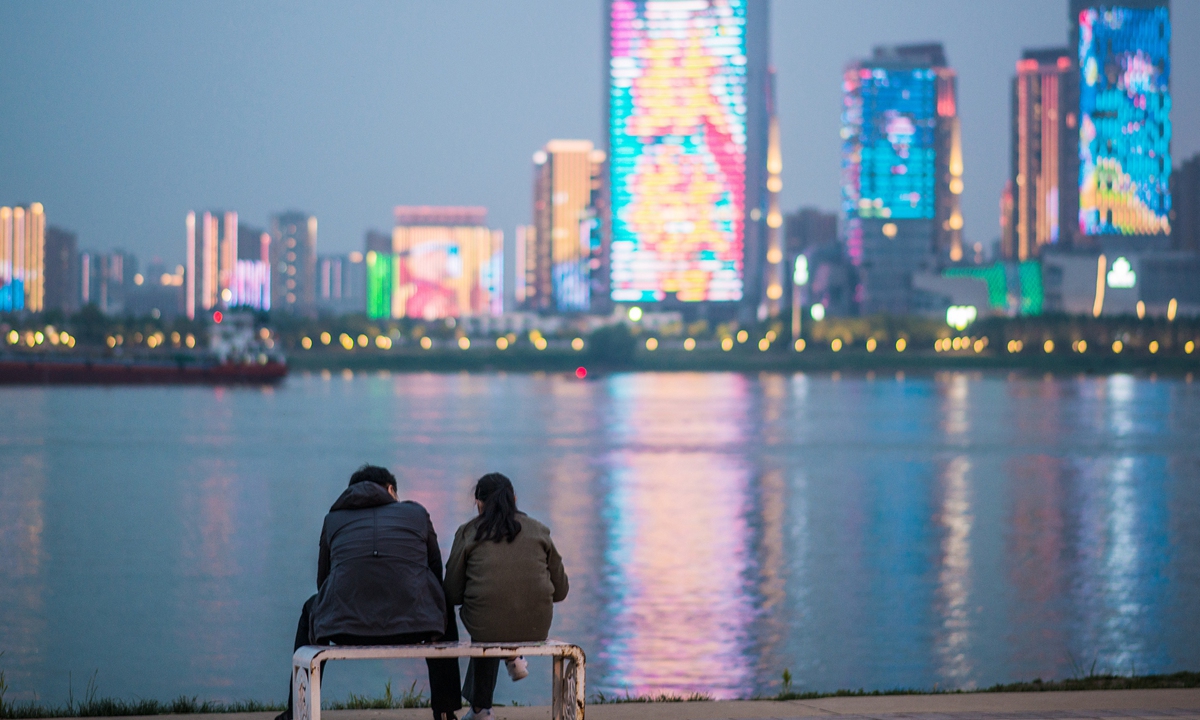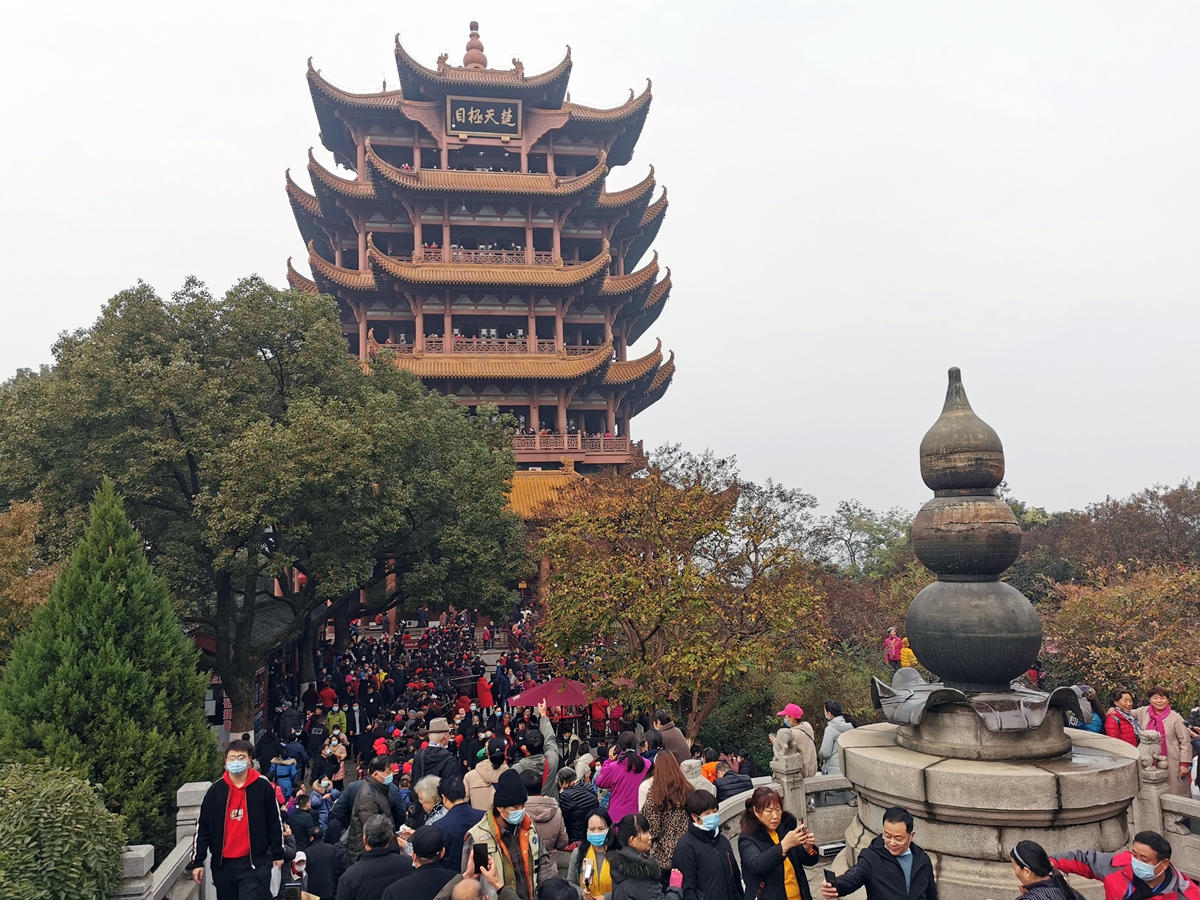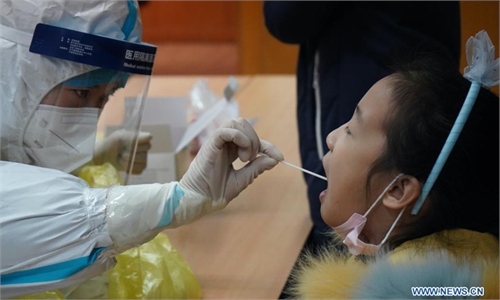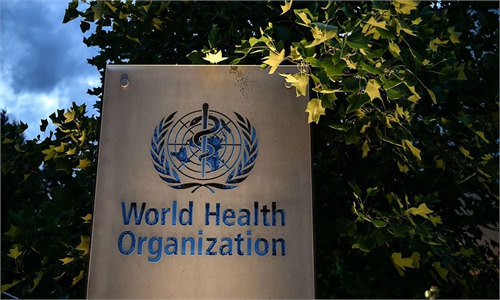
Two people enjoy a Wuhan evening on April 23. Photo: VCG
Before going to Wuhan for college in 2010, the only thing I knew about Hubei was an interesting Chinese saying: "In the sky live nine-headed birds. On the earth live Hubei people," a reference to their intelligence and cunning.After four years in Wuhan, my impression of Hubei people is that they are straightforward and as fiery as its summer heat. Wuhan is known as one of China's "four ovens" due to its hot and humid weather in summer.
Wuhan people speak loudly and are always in a hurry. Taking a bus in Wuhan is like going on a roller coaster ride. Chinese netizens always joke that Wuhan bus drivers must have previously been Formula One racers.
Wuhan is also a place where people can eat anything - whether it is a bowl of noodles, rice and dishes or snacks - while walking on the street or stopping by the roadside.
Although I have been told this kind of behavior is uncouth, I think that eating freely while walking across the grass, through the trees and the flowers on campus and walking along the riverside enjoying both the smell of food and nature is one of the happiest things I have ever experienced in my life.
"It is like a feature of Wuhan. It is the most representative scene of Wuhan's free and easy lifestyle," Zhang Yi, my classmate at Wuhan University, said when I told her that I returned to Wuhan in early December last year and saw the familiar scene of locals eating hot dry noodles while standing at the roadside and students holding bowls of dishes walking through the campus.
At that time, it had been nearly one year since the first COVID-19 infection was discovered in Wuhan, followed by a disastrous outbreak that dragged the city into a months-long nightmare. I could see that Wuhan had come back to life, with shopping malls crowded with people, long lines of milk tea lovers waiting outside a famous shop and business districts heavy with traffic.
During my stay in Wuhan from December 3 to 10, my colleagues and I twice visited a local restaurant famous for dishes cooked in earthen pots, and had to wait for nearly one hour each time.
"Looks like the city has indeed come back to life," my colleague Emily joked. Emily also spent her college time in Wuhan, and is particularly fond of the city's lotus roots and rib soup.
We had the soup for three straight days and Emily even took one bowl back to Beijing. "I tried to cook the soup in Beijing but couldn't make it as delicious as Wuhan people make it. I think the lotus roots and water there are better," Emily said.
Strong spirit
The Nine-headed Bird is a legendary creature in Chinese mythology, and is regarded as one of the earliest forms of the Chinese phoenix. It was worshiped by ancient people in Hubei Province.
In Chinese culture, the phoenix is a symbol of auspiciousness. The symbolism of a phoenix rising from the ashes after a fire represents a strong and unyielding spirit.
But I felt a subtle difference when I saw buses and taxis move in an orderly manner on the road, and when restaurant waiters patiently explained dishes to me and kindly reminded me that I had probably ordered too many.
"Don't you feel that Wuhan people are no longer that hot-tempered and have become gentle?" I asked another of my college mates, a girl named Yang Xiaojin, who is studying in Wuhan for her doctoral degree. "They are as gentle as before," she said.
Maybe I am over-interpreting it, but I believe this to be true. Nowadays, Wuhan is just like a phoenix struggling to rise from the ashes. There is unspeakable pain hiding under its fragile strength.
My view is backed up by a statue at the entrance to Wuhan Chuhe Hanjie, one of Wuhan's busiest business districts. Its inscription reads "Wuhan power" in English and "Gong Xin Sheng" (Reborn together) in Chinese.
"Traffic jams were very bad in Wuhan before the epidemic. At that time, I got very agitated when I was stuck in a traffic jam. But now it feels nice to see roads crowded with vehicles and passengers, as it means that the city is coming back to life," said Xiang Yafei, a restaurant owner in Wuhan.
Xiang served as a volunteer driver helping doctors get to hospitals during the Wuhan epidemic. He said that driving alone on the empty streets left a deep impression on him.
"The streets were all empty but the lights on the road and in buildings around were all on. It made me feel even more lonely and cold. Only at such a moment did I feel that the city was really ill," Xiang said.
A Wuhan civil servant surnamed Pang told me that she could not even imagine how the city would be able to make it through the disaster and face all those impossible missions and challenges.
She said that she and her friends and families barely talk about what happened during the epidemic, especially those whose family members had been infected, or they would not be able to stop crying.
"But the fact is that we succeeded. I just want to say that I am really proud of Wuhan," she said.
Cherishing life
The word I hear the most during interviews in Wuhan is "cherish."
Wuhan people say they now cherish life, cherish their families, cherish health and cherish the city more after the epidemic.
"We are very thankful right now, and we feel great happiness to live with our family - to talk to them and to enjoy a walk in the sunshine. We cherish our lives more than ever," said He Aimin, the mother of Huang Junxi, who works at a local bus operating group and who also sensed the city's solidarity during the crisis.
"For the first time in my life I saw the power of unity, which used to be a word with no actual meaning to me," said Huang, a teenager who lived through the lockdown of Wuhan.

Tourists visit the Huanghe Lou (Yellow Crane Tower) in Wuhan during the National Day holiday on October 1. Photo: VCG
The 12-year-old used to look up to the US, and assumed that the US always outperformed China, but said he realized for the first time there's no need to envy others, as during the unprecedented crisis, a country would only take care of its own people.Lu Jun is a doctor in the emergency department of Tongji Hospital in Wuhan, and was also the first infected medical worker to become critically ill.
He said that when his 3-year-old son grows up, he wants to tell his story and the story of what happened in Wuhan in 2020. "I want to tell him that his father is a hero."
He is a hero not only because he suffered and recovered from the virus, but also because he has resumed his duties as a doctor.
When talking about his New Year wish for 2021, Lu said that he hopes there is no resurgence of the epidemic. He wants people to enjoy a peaceful Spring Festival and be able to get together with family and friends.


